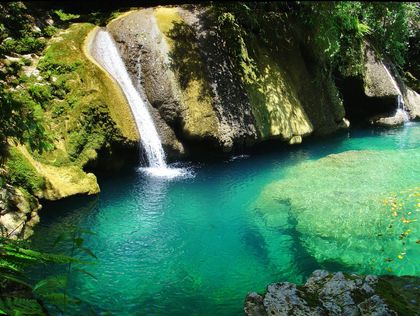JAMAICA

CAPITAL : Kingston
FLAG : Two diagonal yellow gold bars forming a saltire divide the flag into four triangular panels. The two side panels are black, and the top and bottom panels are green.
ANTHEM : First line, "Eternal father, bless our land…"
MONETARY UNIT : The Jamaican dollar ( J $) of 100 cents was introduced on 8 September 1969. There are coins of 1, 5, 10, and 25 cents, and 1 dollar, and notes of 2, 5, 10, 20, 50, and 100 dollars. J $1 = US $0.01766 (or US $1 = J $56.6) as of May 2003.
WEIGHTS AND MEASURES : Both metric and imperial weights and measures are used.
HOLIDAYS : New Year's Day, 1 January; Labor Day, 23 May; Independence Day, 1st Monday in August; National Heroes' Day, 3rd Monday in October; Christmas, 25 December; Boxing Day, 26 December. Movable religious holidays include Ash Wednesday, Good Friday, and Easter Monday.
TIME : 7 AM = noon GMT.
LANGUAGES
Jamaica is an English-speaking country and British usage is followed in government and the schools. Creole is also often used.
ARMED FORCES
The Jamaica Defense Force assumed responsibility for the defense of Jamaica following the withdrawal of British forces in 1962. The total defense force in 2002 numbered 2,830 personnel with 950 reserves. The army accounted for 2,500 personnel, the coast guard 190, and the air wing 140. In 1997–98, Jamaica spent $47.9 million on defense.
FISHING
The fishing industry grew during the 1980s, primarily from the focus on inland fishing. Whereas the inland catch in 1982 was 129 tons, by 2000 it had risen to 450 tons. Nevertheless, substantial imports have been required to meet domestic needs. The total catch in 2000 was 5,676 tons.
DEPENDENCIES
Jamaica has no territories or colonies.
BIBLIOGRAPHY
Bakan, Abigail B. Ideology and Class Conflict in Jamaica: The Politics of Rebellion. Montreal: McGill-Queen's University Press, 1990.
Barrow, Christine. Family in the Caribbean: Themes and Perspectives . Kingston, Jamaica: I. Randle, 1996.
Bryan, Patrick E. The Jamaican People, 1880–1902: Race, Class and Social Control. London: Macmillan Caribbean, 1991.
Butler, Kathleen Mary. The Economics of Emancipation: Jamaica and Barbados, 1823-1843 . Chapel Hill: University of North Carolina Press, 1995.
Health in the Americas, 2002 edition. Washington, D.C.: Pan American Health Organization, Pan American Sanitary Bureau, Regional Office of the World Health Organization, 2002.
Holt, Thomas C. The Problem of Freedom: Race, Labor, and Politics in Jamaica and Britain, 1832–1938. Baltimore: Johns Hopkins University Press, 1992.
Keith, Nelson W. The Social Origins of Democratic Socialism in Jamaica. Philadelphia: Temple University Press, 1992.
LaFont, Suzanne. The Emergency of an Afro-Caribbean Legal Tradition: Gender Relations and Family Courts in Kingston, Jamaica . San Francisco: Austin Winfield, 1996.
Monteith, Kathleen E. A. and Glen Richards (eds.). Jamaica in Slavery and Freedom: History, Heritage and Culture. Kingston, Jamaica: University of the West Indies Press, 2002.
Mordecai, Martin. Culture and Customs of Jamaica. Westport, Conn.: Greenwood Press, 2001.
Summers, Randal W., and Allan M. Hoffman (ed.). Domestic Violence: A Global View. Westport, Conn.: Greenwood Press, 2002.